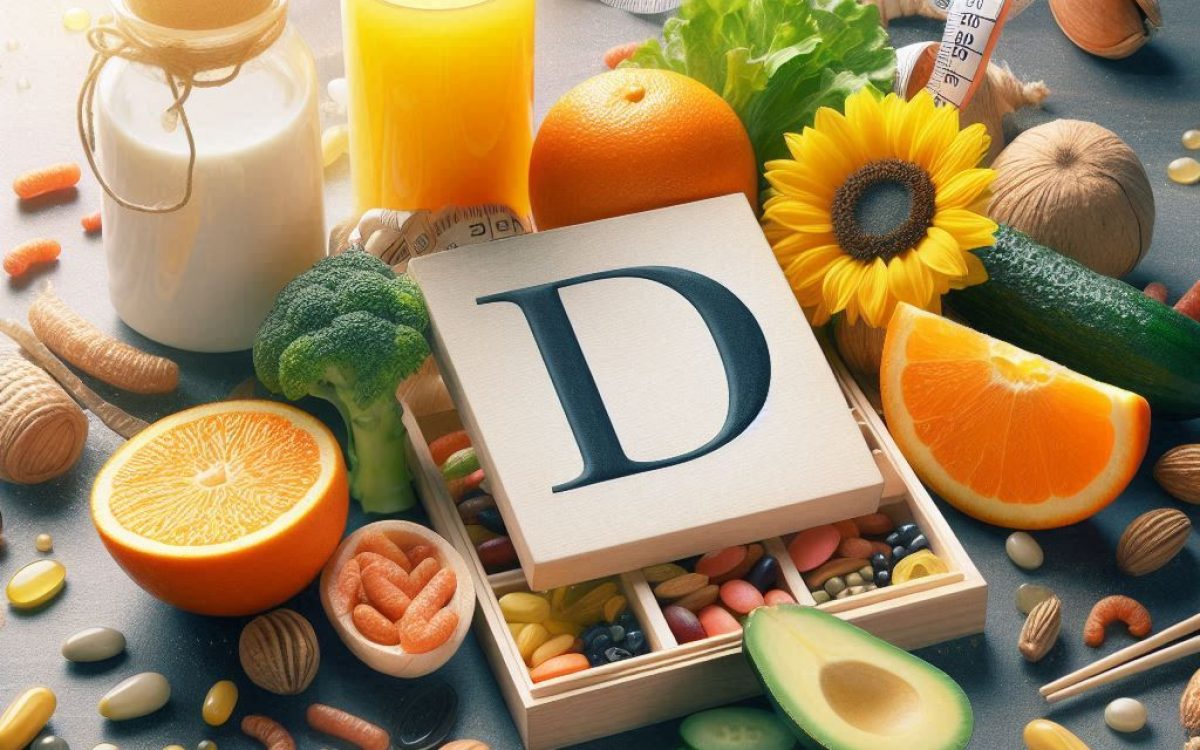Often overlooked, vitamin D is a silent powerhouse—essential for maintaining strong bones, a healthy immune system, and mental well-being. In today’s fast-paced world shaped by indoor lifestyles and nutritional imbalances, this “sunshine vitamin” is more vital than ever. Often referred to as the “sunshine vitamin,” it is naturally produced in the body when exposed to sunlight. However, that does not diminish the importance of other sources and methods of obtaining it.
In this article, we will explore the relationship between vitamin D and proper nutrition, its health benefits, natural sources, factors affecting its absorption, symptoms of deficiency, and ways to prevent and treat it—while highlighting its vital role in everyone’s life.
What is Vitamin D?

Vitamin D is a fat-soluble vitamin that helps your body absorb calcium and phosphorus—minerals vital for building strong bones and healthy teeth. What makes it unique among vitamins is its natural production in the skin when exposed to sunlight, specifically UVB rays.
There are two main forms of vitamin D:
- Vitamin D2 (Ergocalciferol): Found in plant-based sources like mushrooms.
- Vitamin D3 (Cholecalciferol): Synthesized in the skin via sunlight and present in animal products—this form is more effective at raising and maintaining vitamin D levels in the blood.

The Importance of Vitamin D in Proper Nutrition:
While this nutrient is best known for supporting bone health, its benefits go far beyond that. It’s involved in multiple body systems, influencing immunity, mood, and even chronic disease prevention.
- Enhancing Calcium Absorption:
One of its most critical roles. Without adequate levels, the body cannot efficiently absorb calcium from food, leading to weakened bones and increased fracture risk. - Supporting the Immune System:
It strengthens immunity, helping the body fight infections and reduce inflammation. Research also links low levels to increased risk of depression, particularly in darker, colder seasons with limited sun exposure. - Mood Regulation and Mental Health:
Several studies have found a link between it deficiency and depression, especially during winter months when sun exposure is limited. - Maintaining Muscle Health:
It affects muscle strength and function. Its deficiency can lead to muscle weakness and cramps. - Cancer Prevention:
There is evidence suggesting that vitamin D may help lower the risk of certain cancers, including colon, breast, and prostate cancer.

Sources of Vitamin D:
1- Sunlight Exposure:
The most natural source—just 10–30 minutes of direct sun on arms, face, or legs a few times a week can keep your levels healthy. Early morning or late afternoon is ideal.
2- Vitamin D-Rich Foods:
-
-
- Fatty fish such as salmon, tuna, and sardines
- Beef liver
- Egg yolks
- Fortified milk and dairy products
- Fortified breakfast cereals
-
3- Dietary Supplements:
Recommended if sun exposure and diet aren’t enough—always under medical guidance.

Factors Affecting Vitamin D Absorption:
- Skin Color:
Darker skin has more melanin, which slows the nutrient’s production. - Age:
As we age, our skin becomes less efficient at synthesizing it. - Body weight:
Obesity can trap it in fat cells, lowering blood levels. - Frequent Use of Sunscreen:
While protective, it blocks UVB rays needed for synthesis. - Geographic Location and Climate:
Living far from the equator or in cloudy regions limits sun exposure.
Symptoms of Vitamin D Deficiency:
- Bone softness or fragility (osteomalacia/osteoporosis)
- Persistent fatigue and tiredness
- Weakened immunity and frequent infections
- Muscle and joint pain
- Mood disorders and depression
Who is Most at Risk of Vitamin D Deficiency?
- People who spend most of their time indoors
- Elderly individuals
- People with obesity
- Individuals with darker skin tones
- Those with liver or kidney disorders
- Strict vegans who avoid animal-based products
The Link Between Proper Nutrition and Vitamin D:

Proper nutrition is incomplete without a balanced intake of vitamins and minerals and It is essential in maintaining this balance. It enhances calcium absorption, which supports skeletal health. Its role in boosting immunity and controlling inflammation strengthens the body’s defense system and reduces the risk of chronic diseases.
A varied diet rich in vitamin D, calcium, and protein significantly enhances the effectiveness of it in the body. For example, eating salmon with a glass of fortified milk can provide substantial nutritional benefits.
How to Prevent Vitamin D Deficiency:
- Regular exposure to sunlight
- Eating vitamin D-rich foods
- Taking supplements when necessary under medical guidance
- Routine blood tests to monitor vitamin D levels (as recommended by health authorities like the National Institutes of Health)
- Maintaining a balanced diet and encouraging healthy lifestyle habits in both children and the elderly
Recommended Daily Intake:
- Infants up to 1 year: 400 IU
- Children and adolescents: 600 IU
- Adults up to age 70: 600–800 IU
- Adults over 70: 800–1000 IU
- Pregnant and breastfeeding women: 600–800 IU (may vary depending on individual needs)
Vitamin D is more than just a vitamin—it’s a foundation for lifelong wellness. Supporting bone strength, immunity, and even mental clarity, it deserves a permanent place in your health routine.
At Nutrition Travels, we believe that health starts with awareness. Follow us for more tips, facts, and nutrition journeys from around the world.





